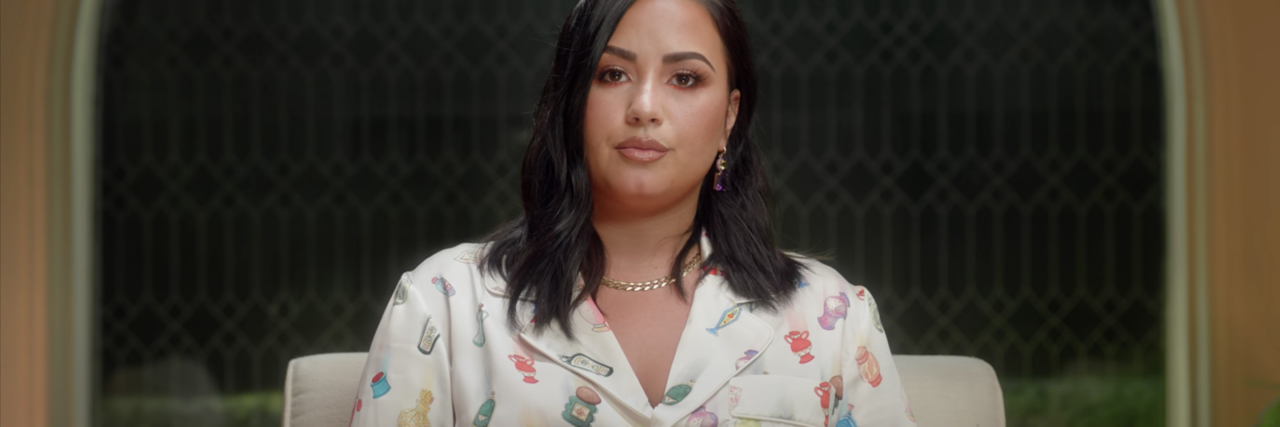Demi Lovato's Documentary Is the Story of Trauma, Not Addiction
Editor's Note
If you’ve experienced sexual abuse or assault, the following post could be potentially triggering. You can contact The National Sexual Assault Telephone Hotline at 1-800-656-4673.
If you or a loved one is affected by addiction, the following post could be triggering. You can contact SAMHSA’s hotline at 1-800-662-4357.
Demi Lovato’s new documentary, “Demi Lovato: Dancing With The Devil,” which premiered on March 23 on YouTube, delves into the raw, uncensored details of her 2018 overdose which almost killed her. It follows her relapse from sobriety and her subsequent recovery through candid interviews with the singer, close friends and family.
While the documentary may appear to be a story about addiction, sobriety and the myriad ways in which drugs and alcohol can nearly destroy your life, the narrative that I kept seeing was one of trauma: past trauma, current trauma and the unrealistic expectations that the media and being in public life can bring with it.
Demi alludes to her “daddy issues” as something pervasive in her feelings of abandonment and inadequacy. She also discusses numerous experiences with sexual abuse and assault, including being taken advantage of by her dealer the night of her overdose. And yet… the primary question that she keeps being asked is how she could get addicted to drugs, get sober and then relapse, as if this pattern is somehow an aberration or some kind of moral failing. I cry foul.
It is well-documented by researchers like Dr. Gabor Maté, that addiction is very often a coping strategy or a way of numbing pain and feelings from past trauma. Maté states that: “It is impossible to understand addiction without asking what relief the addict finds, or hopes to find, in the drug or the addictive behavior.” While there may well be a chemical and genetic component to addiction that makes some individuals more susceptible to becoming addicted in the first place, relapses like the one Demi Lovato experienced are quite common when treatment for substance abuse doesn’t adequately address past trauma.
Lovato is also very vocal about her struggles with and recovery from an eating disorder which is also something that is often more a symptom of an underlying issue like past trauma. I had a similar trajectory with my own sexual abuse and “mommy/daddy issues” which led me to seek out something I could control in my life. Since my body had been violated, I sought to not just control that body but to subconsciously hurt it as a way of not having to deal with the emotional pain of my abuse. This paired with being involved in the entertainment industry, where image is so closely scrutinized, would become a perfect storm for someone like Lovato.
When she was on tour in 2018, her team had her under such tight control in terms of monitoring what she ate, drank, how much she exercised and what she did that any sense of autonomy and control she may have felt before was completely taken away from her, rendering her almost helpless, like a child. Her subsequent return to drug use isn’t really a shock when seen in context… it was a rebellion and a desperate attempt at reclaiming herself.
And finally, Lovato and her friends/family all make the point that when she first went into rehab it wasn’t her choice, she was coerced to do so by those around her. They stress that recovery and healing cannot occur unless the person struggling wants to be there and is invested in doing so. Toward the end of the second episode, Lovato owns that she never had a motivation to recover until she almost died. That was the impetus she needed to start the healing journey. It awakened her to how her past trauma was destroying her life and the COVID-19 pandemic lockdown gave her the time and space to focus on herself and do the hard, painstaking work she needed to do in therapy. She stresses that while the trauma she endured wasn’t her fault, she believes that healing and taking ownership of how her behavior affected everyone around her is her responsibility.
At the beginning of each episode, the quote “It’s OK to not be OK” is flashed across the screen. It’s clear that Demi Lovato’s mission in so openly and honestly sharing her truth is intended to normalize and destigmatize mental health struggles. She has always been an advocate for mental health, but now her life itself is a testament to resilience, the capacity to heal from trauma and the power of healthy relationships to that healing journey.
Image via YouTube

